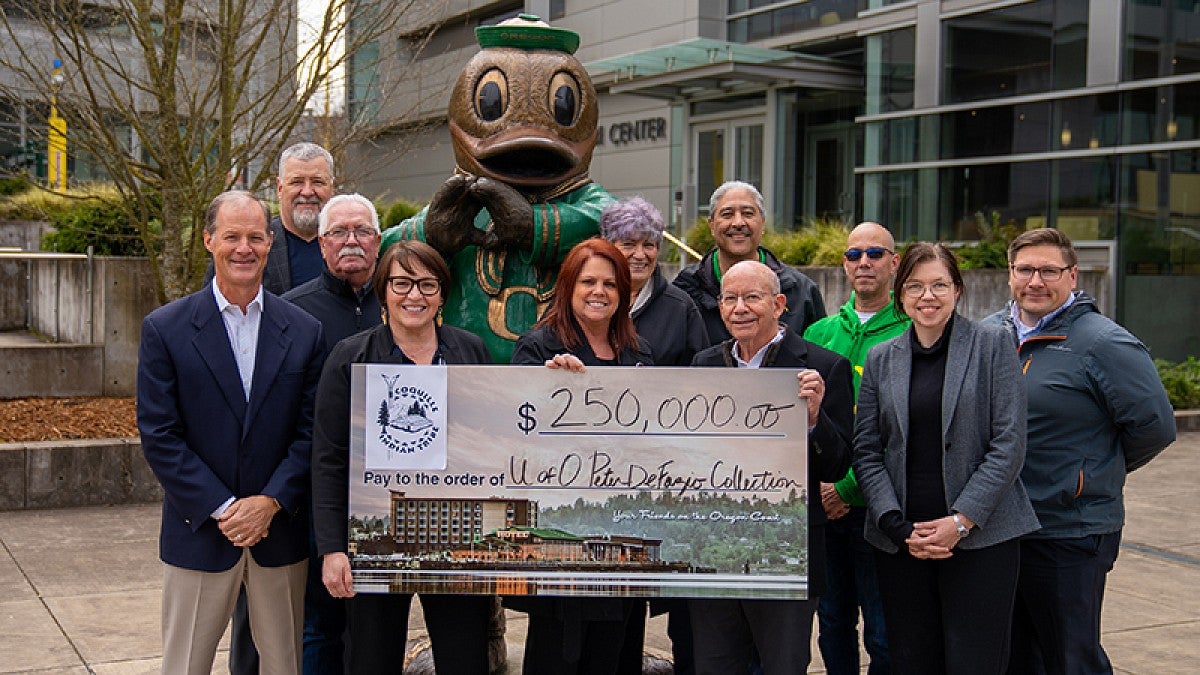Thanks to a $250,000 gift from the Coquille Indian Tribe, the UO will be able to catalogue the recently donated archives of alumnus Congressman Peter DeFazio from his 36-year tenure in the U.S. House of Representatives.
The archives comprise emails, letters and other official documents from DeFazio’s office and fill up 700 bankers’ boxes, each holding 30 to 35 folders containing reams of documents in each, along with three terabytes of electronic records. It represents the largest single donation ever to the UO’s Special Collections and University Archives, which will ultimately make it available to the public.
However, it takes a massive amount of time and labor to inventory and catalog exactly what the collection contains — paper by paper and every electronic document — and organize it in a way that makes it accessible.
The generous gift from the Coquille Tribe to the university, the largest ever by the tribe to the UO, will allow for the library to do just that, including hiring interns who self-identify or are members of a tribe. They will receive instruction in archival studies to help process the DeFazio papers and hold events to promote the archives’ accessibility, along with other functions.
“Bringing these important historical records to the University of Oregon Libraries means this major part of history will be preserved and made available to the public,” said University Librarian Alicia Salaz. “Future generations of Coquille, historians, researchers, policymakers, activists and educators will always be able to remember and draw new insights from these records, thanks to this incredibly generous support.”
The connection between the Coquille and DeFazio is strong. The Springfield lawmaker was instrumental in regaining federal recognition for the tribe as a sovereign nation in 1989 after it was terminated in 1954 and was critical in generating other legislative and federal support for the Coquille.
“When we heard about this project, we were pretty excited about it,” said Brenda Meade, the tribal chair, “mainly because one of the first pieces of legislation that Congressman DeFazio carried was our restoration act. He carried that bill fearlessly and really fought for us through a time that the (Bureau of Indian Affairs) wasn't super supportive. And it changed our world.”
When he was first elected, DeFazio sought to rectify a wrong by getting the Coquille federal recognition after it was stripped, something that should have happened with all tribes who suffered the same fate, he said. He was appreciative of the tribe’s donation and what it will mean for his papers.
“It’s a phenomenal gift, a very large bequest that will really help process the archives,” DeFazio added. “Without contributions from the Coquille and others, it would just be sitting in boxes forever.”
“Peter’s legacy is extraordinary and personal for the Coquille. Few know what it’s like to be told, ‘you are no longer a Native American,’,” said Jason Younker, UO assistant vice president and adviser to the president for sovereignty and government-to-government relations who is also chief of the Coquille Tribe. “Peter stood up for victims like the Coquille and other tribes, who had no voice after termination. We have never forgotten, and we are forever grateful for his service and friendship.”
David de Lorenzo, Giustina Director of the Special Collections and University Archives, expects the process to catalog, organize and label the archives to take three years. Once complete, the public will be able to research the collection’s contents online and then view the documents at the library.
DeFazio’s donation also included funding to begin the intake process. The gift from the Coquille will allow it to be completed.
The archives document DeFazio’s legislative achievements and public engagement efforts, including records pertaining to work with Oregon communities. They will also give insight into the process of crafting and passing legislation, de Lorenzo said.
“These are very complicated and long-term processes, and often that story can be told through the archive,” de Lorenzo said. “And I think that's really where we're looking for research to occur subsequent to getting the collection available to public.”
As part of housing and promoting access to his archives, the library plans to hold lectures with DeFazio and other guests on issues related to his tenure in Congress, with tribal members among the invitees.
The gift will also allow the library to offer financial support to students, researchers or scholars interested in doing research in the DeFazio papers.
Long-term plans also include developing an oral history with DeFazio that can provide additional context to the papers or add details.
Donations the size of DeFazio’s and gifts as large as that from the Coquille are rare, so to receive both represents an uncommon and tremendous opportunity, he added.
“We don't ever get money for processing congressional papers, so to get this additional gift from the Coquille Tribe is incredibly generous and really will do some important things that are both directed to the collection but also to building out Congressman DeFazio's legacy,” de Lorenzo said. “So I'm extremely happy and very pleased, and I want to thank them as much as I can for their generosity.”
—By Jim Murez, University Communications
—Top image, from left: Paul Weinhold, UO Foundation president and CEO; Mark Johnston, Coquille Indian Tribe executive director; Don Garrett, Coquille Indian Tribe tribal council; Jenn Procter-Andrews, Coquille Indian Tribe tribal council; Brenda Meade, Coquille Indian Tribe tribal council chair; Laura Beth Barton, Coquille Indian Tribe tribal council; Jason Younker, Coquille Indian Tribe tribal council chief; former U.S. Rep. Peter DeFazio; Jon Ivy, Coquille Indian Tribe tribal council vice-chair; Alicia Salaz, UO vice provost and Knight Librarian; and Kyle ViskneHill, Coquille Indian Tribe chief financial officer.


